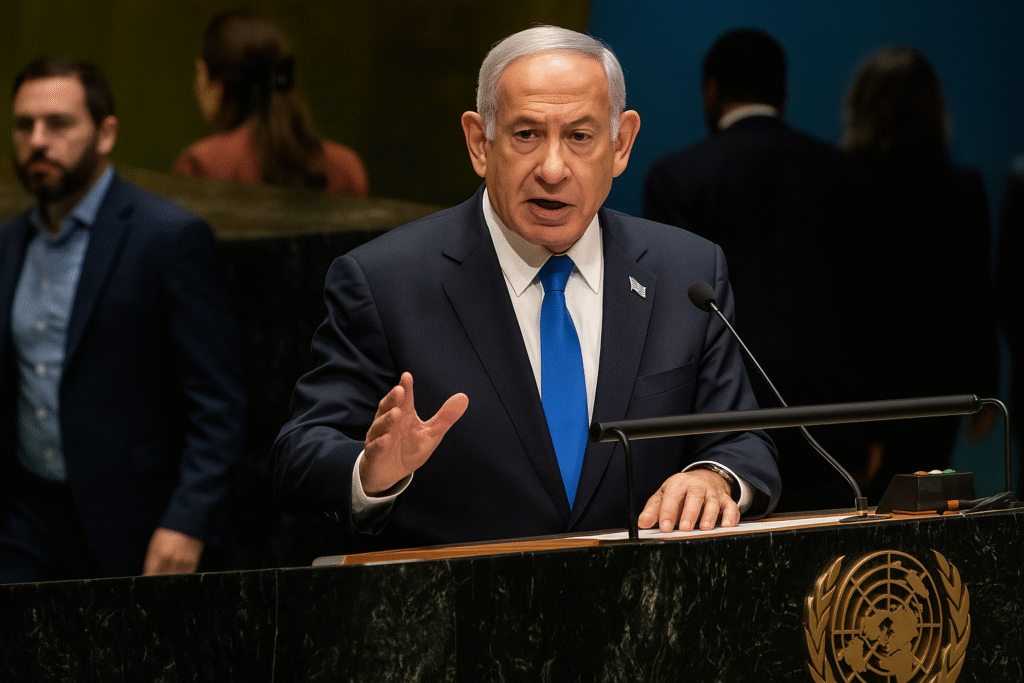By Harshit | September 27, 2025 | New York, USA | 1:30 AM EDT
Israeli Prime Minister Benjamin Netanyahu delivered a combative speech at the UN General Assembly, sharply criticizing Western countries for recognizing a Palestinian state. He described the recognition as a “mark of shame” and claimed it sent the message that “murdering Jews pays off,” prompting dozens of officials and diplomats to stage a walkout during his address.
Key points from Netanyahu’s speech
Netanyahu displayed a map he labelled “The Curse,” depicting Iranian proxy groups across the Middle East, and outlined Israeli military operations over the past year targeting Hezbollah in Lebanon, Houthis in Yemen, Hamas in Gaza, and Iran.
He praised US involvement in the June bombing of Iran’s Fordo nuclear site and drew parallels between Hamas’s 7 October 2023 attack on Israel and the 9/11 attacks in the United States. He also reiterated that Israel would not permit a Palestinian state to exist, asserting that this position reflects the views of the majority of Israelis.
In addition, Netanyahu dismissed a UN commission of inquiry’s conclusion that Israel had committed genocide in Gaza as “baseless,” and rejected claims by UN agencies that Israel was intentionally restricting humanitarian aid. In August, a UN-backed body confirmed that famine conditions existed in Gaza City.
Messaging to hostages and Gaza residents
Ahead of his speech, the Israeli government mounted loudspeakers on trucks near Gaza’s perimeter fence to broadcast Netanyahu’s address directly into the territory. He also claimed that Israeli intelligence had hacked Gazan smartphones to stream his speech, though BBC sources in Gaza reported that phones were unaffected.
Addressing the hostages, Netanyahu said:
“Our brave heroes. We have not forgotten you, not even for a second. The people of Israel are with you. We will not falter, and we will not rest until we bring all of you home.”
There are currently 48 hostages remaining in Gaza, 20 of whom are believed to be alive. Gaza residents criticized the stunt; one resident, Fadi, told the BBC, “What does he gain by broadcasting his speech forcibly to the besieged civilians inside the tents, except to further humiliate them?”
Domestic and regional reactions
Netanyahu also addressed Israel’s regional relations, noting progress toward a de-escalation agreement with Syria and urging Lebanon to disarm Hezbollah.
Within Israel, opposition figures strongly criticized the speech. Yair Lapid called it “a weary and whining speech, overloaded with overused gimmicks,” while Yair Golan of the Democrats party described the loudspeaker stunt as “invalid, childish, and insane,” accusing the prime minister of showing only victimhood and ignorance of the hostages’ suffering.
International context
The speech follows recent recognition of a Palestinian state by the UK, France, Canada, Australia, and other countries, amid mounting international pressure on Israel over its military operations in Gaza. The conflict, triggered by Hamas’s attack on southern Israel on 7 October 2023, has led to at least 65,549 deaths in Gaza according to the Hamas-run health ministry, while around 1,200 Israelis were killed and 251 taken hostage.
Palestinian Authority leader Mahmoud Abbas addressed the General Assembly a day earlier, expressing readiness to cooperate with international leaders on a peace plan, rejecting Hamas’s governance of Gaza.
Following Netanyahu’s address, former US President Donald Trump suggested a ceasefire deal for Gaza may be near, although no details were provided.
Challenges for verification
Independent international journalists have largely been barred from entering Gaza since the start of the war, making independent verification of claims from both sides difficult. Some journalists have been allowed entry only under Israeli military supervision.
Netanyahu’s UN address underscores Israel’s firm stance against Palestinian statehood while highlighting tensions with both international observers and domestic political opponents. The speech has intensified debate over humanitarian conditions in Gaza and the prospects for a negotiated resolution to the ongoing conflict.

